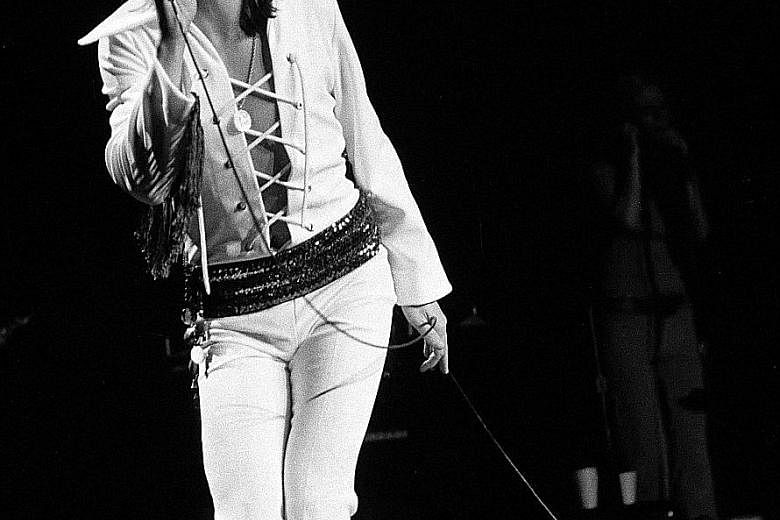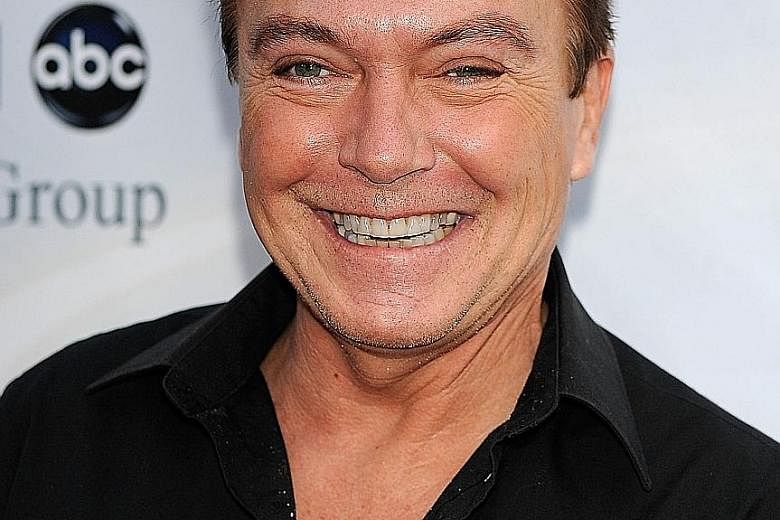LOS ANGELES • David Cassidy, the actor and teen heart-throb best known for his role as the musician with the green eyes and the feathered haircut on the 1970s television sitcom The Partridge Family, died on Tuesday. He was 67.
He died in the intensive care unit of a Florida hospital, his publicist Jo-Ann Geffen said. He was hospitalised over the weekend for treatment of liver failure. He revealed this year that he had dementia.
Ms Geffen released a statement from his family that said he died surrounded by family "with joy in his heart and free from the pain that had gripped him for so long".
Cassidy rose to fame on The Partridge Family playing Keith Partridge, the eldest of five children in a family that forms a band and goes on tour.
His character, a staid, occasionally doltish high-school student, was periodically swooned over by young women as he learnt to navigate his newfound fame.
The series ran from 1970 to 1974 and turned Cassidy into a star with hordes of adoring fans, who drew comparisons to those of Elvis Presley and The Beatles.
The New York Times reported that after Cassidy's gall bladder was removed in 1971, fans called for his gall stones to be covered in bronze and sold alongside clippings of his hair.
His entrails remained off the market, but for several years, his likeness was emblazoned on posters, push-out cards, colouring books and lunchboxes, as the band he led on television - The Partridge Family, a true family outfit that featured his stepmother Shirley Jones - became one of the decade's defining pop music acts, beloved by a mostly female audience and derided by critics who heard only bubble-gum blandness.
The quintet sported matching vests and shoulder-length hair and scored their first chart-topper with I Think I Love You (1970), a breezy pop song written by Tony Romeo for the programme's eighth episode: "Do you think I have a case?/Let me ask you to your face/Do you think you love me?/I think I love you!"
But the young star struggled with the paradoxical isolation of a life lived in the spotlight.
"Oh, they're cute. They get flustered and I get flustered and it's all kind of fun," he said of his devotees in 1972. "But it's no fun when they rip your clothes and take rooms next door in hotels and keep pounding on the door and slipping notes under it."
In an attempt to spice up his squeaky-clean image, he posed provocatively in a photo shoot for Rolling Stone in 1972. In the cover story, he said he was already dreaming about the end of his acting career.
"I'll feel really good when it's over," he said. "I have an image of myself in five years. I'm living on an island. The sky is blue, the sun is shining. And I'm smiling, I'm healthy, I'm a family man."
Announcing his retirement from performing in 1974, he told Britain's Daily Mail: "I feel burnt up inside. I'm 24, a big star... in a position that millions dream of, but the truth is I just can't enjoy it."
Soon after the interview, a farewell concert in London ended in a near-riot and the death of a 14-year-old girl, who suffered a heart attack.
Cassidy, free of performance duties and acting, underwent a period of depression that he said culminated two years later with the death of his estranged father in a fire.
He veered from television to theatre to music, performing in concerts as a guitarist as recently as this year.
In later years, he wrote books about the toll stardom had taken on him and about his own struggles with substance abuse. After watching his mother struggle with dementia, he worked with organisations to educate others about Alzheimer's disease.
He eventually found solace in breeding horses and slowly came to terms with what he described as his unbreakable connection with Keith Partridge - "a shallow airhead", as Cassidy described the character to Interview magazine in 1991, who was "supposed to be funny".
"I didn't ever think that people would assume I was that guy," he continued. "But they did."
David Bruce Cassidy was born in Manhattan on April 12, 1950, to Tony-winning actor Jack Cassidy and actress Evelyn Ward.
After his parents divorced in 1956, he moved to California with his mother. He struggled in school, but began taking small parts in plays and on television, eventually leading to his big break on The Partridge Family.
He then returned to New York after completing high school and appeared in the disastrous 1969 Broadway musical The Fig Leaves Are Falling. The show ran for just four performances, but helped Cassidy land an audition for The Partridge Family later that year.
He experienced a brief television resurgence in the late 1970s, when he was nominated for a best actor Emmy for his role as an undercover police officer in the NBC anthology series Police Story. The part resulted in a spinoff programme, David Cassidy: Man Undercover, that was cancelled in 1979 after one season.
Returning to the stage, he performed the title role in the Broadway production of Joseph And The Amazing Technicolor Dreamcoat - replacing another former teen idol, Andy Gibb, in 1982 - and a decade later appeared alongside his half-brother Shaun Cassidy in the Willy Russell musical Blood Brothers.
A self-titled album appeared in 1990, featuring the hit Lyin' To Myself, and Cassidy steadily reestablished himself as a performer, singing his Partridge-era classics while appearing in programmes such as the Donald Trump reality series Celebrity Apprentice.
Cassidy was married and divorced three times. He is survived by his son Beau, a musician; his daughter Katie, an actress; his stepmother Jones; and three half-brothers, Patrick, Ryan and Sean.
Publicity, Cassidy said, was not something he wanted after his time on The Partridge Family. In its place, he sought a certain degree of anonymity.
"I have always tried to be someone who doesn't get noticed," he told The Times of London in 2006. "I wear a hat and glasses all the time. I try to be part of our society so I can exist without being a freak."
NYTIMES, REUTERS, WASHINGTON POST


